Welcome, tech enthusiasts! Today, we’re exploring the stylish realm of PC cases – the snazzy outfits for your computer.
Imagine these cases as the fashion choices for your tech. Full towers are spacious mansions, mid
towers are cozy apartments, and mini towers are cute tiny homes. Cubes are the stylish condos, and rackmounts mean business.
We’ve got your back whether you’re a gamer or a pro. Let’s dive into the world of PC cases where practicality meets personality. Ready?
Here are Different Types of PC Case
Hey there, tech explorers! Today, we’re diving into the world of PC cases, but don’t worry; it’s not as complicated as it sounds.
Think of a PC case like your computer’s outfit – it protects it and makes it look cool.
| PC Case Type | Description |
|---|---|
| Full Tower PC Cases | Spacious, accommodating numerous components, but large and potentially expensive. |
| Mid Tower PC Cases | Balanced size, fitting most components and being budget-friendly. |
| Mini Tower Cases | Compact and budget-friendly, suitable for smaller setups. May not accommodate all components. |
| Desktop Case | Standard-sized cases suitable for everyday use, neither too large nor too compact. |
| Small Form Factor (SFF) Cases | Compact and space-saving, great for minimalistic setups. |
| Ultra-Small Form Factor (USFF) Cases | Extremely compact, ideal for tight spaces and minimal setups. |
| Cube PC Cases | Stylish and practical, making your PC stand out with a unique design. |
| Rackmount PC Cases | Designed for business and enterprise use, focusing on practicality and functionality. |
So, whether your computer wants a mansion, an apartment, a tiny home, a stylish condo, or an office building, there’s a PC case for everyone.
Think about what your computer needs and how much space it wants to take up, and you’ll find the perfect outfit for your tech buddy!
1. Full Tower PC Cases
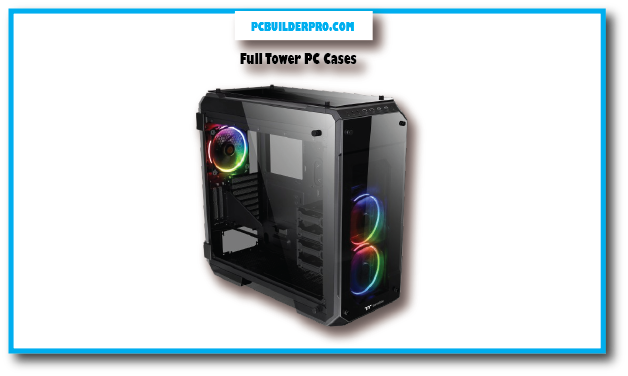
Full tower PC cases are the giants of the computer case world, offering oodles of room for your hardware and customization dreams. They’re like the SUVs of the PC case world, built
for those who need to haul a lot of gear, whether it’s multiple hard drives, beefy graphics cards, or even a custom water-cooling setup. But, like any big decision in life, there are pros
and cons to consider before diving into the world of full tower cases. In this guide, we’ll help you navigate the choices and introduce
you to some of the best full tower cases available in 2023.
Pros of Full Tower Cases:
Spacious Bliss: Full tower cases give you all the room you could dream of for your components and future upgrades. It’s like having a mansion for your computer.
Chill Vibes: These cases often come with excellent airflow and cooling potential, ensuring your system stays frosty even when things heat up.
Multi-GPU and Hard Drive Haven: If you’re into gaming or have a ton of data to store, full tower cases are your friends. They can accommodate multiple graphics cards and a bunch of hard drives without breaking a sweat.
Water Cooling Wonderland: If you’ve ever wanted to dive into the world of custom water cooling loops, full towers provide the space and support you need to make it a reality.
Feature-Filled Fun: These cases usually come loaded with extras like RGB lighting, cable management options, and fancy tempered glass panels. It’s like adding some bling to your rig.
Cons of Full Tower Cases:
Size Matters: Full towers can be massive and might not fit in your cozy computer nook. Measure your space before you commit.
Costly Choices: Bigger isn’t always cheaper. Full tower cases can be more expensive than their smaller counterparts.
Not for Everyone: Full towers are fantastic for power users, gamers, and enthusiasts, but if you’re not planning to max out your components, they might be overkill.
Top Full Tower Cases in 2023:
Here’s a quick peek at some of the best full tower cases on the market this year:
| Case Model | Key Features |
|---|---|
| Phanteks Enthoo Pro | Excellent cooling, spacious, and customizable |
| be quiet! Dark Base Pro 900 | Premium build quality and sound insulation |
| Fractal Design Define 7 XL | Sleek design, ample storage options |
| Corsair Obsidian 1000D | Premium materials, dual-system support |
| Lian Li O11 Dynamic EVO | Stunning aesthetics, great for water cooling |
Finding Your Perfect Match:
When you’re hunting for the right full tower case, consider the following:
Size Matters: Make sure it fits where you want it to go.
Cooling Goals: Check for adequate fan mounts and ventilation to keep your components cool.
Feature Fun: Decide what extras you want, be it dazzling RGB lighting, cable management options, or the elegance of tempered glass.
Budget Boundaries: Set a budget before you start shopping and stick to it.
Full tower cases are the kings of PC enclosures for those who crave ample space and high-performance potential. While they may be hefty and pricier, they’re a must-have for gamers
and tech enthusiasts looking to build a top-tier system. So, measure your space, keep your cooling cool, and budget smartly.
Your perfect full tower case is out there, waiting for you to make it your hardware haven.
2. Mid Tower PC Cases
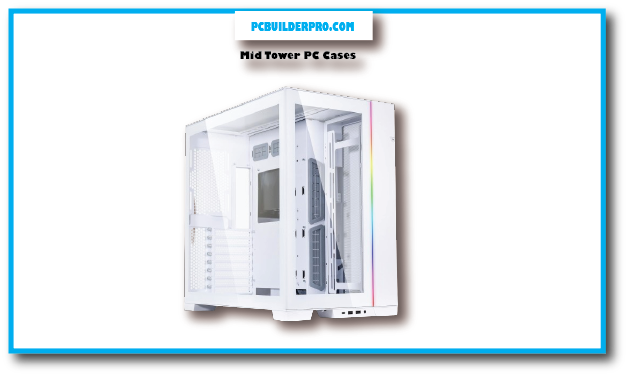
Mid-tower PC cases are the Goldilocks of the PC world—just the right size for most users. They strike a balance between space, features, and cost, making them a top pick for many.
In this guide, we’ll explore why mid-tower cases are so popular, discuss their pros and cons, and introduce you to some of the best mid-tower cases available in 2023.
Pros of Mid Tower Cases:
Balanced Brilliance: Mid-tower cases offer an ideal equilibrium between size, features, and price. It’s like the sweet spot for most PC builders.
Just Roomy Enough: They’re large enough to accommodate most components comfortably but not so big that they become unwieldy or take up too much space.
Cool as a Cucumber: Mid-tower cases typically come with good airflow and cooling potential, ensuring your system stays chill even during intense tasks.
Feature Fiesta: They often come equipped with a variety of features, including options for RGB lighting, cable management, and sleek tempered glass panels for a touch of elegance.
Cons of Mid Tower Cases:
Size Constraints: While they fit most components, they might not have the space for high-end gear like multiple large graphics cards or complex custom water cooling setups.
Feature Limitation: Compared to full tower cases, mid towers might not have as many fancy extras, but they still offer a good balance.
Top Mid Tower Cases in 2023:
Here’s a quick look at some of the best mid-tower cases on the market this year:
| Case Model | Key Features |
|---|---|
| Corsair 4000D Airflow | Excellent airflow and cable management |
| Fractal Design Meshify C | Sleek design, outstanding airflow |
| Phanteks P400A | High airflow, spacious interior |
| be quiet! Pure Base 500DX | Silent operation, excellent build quality |
| Lian Li Lancool II Mesh | Aesthetic design, versatile cooling options |
Finding Your Ideal Mid-Tower Case:
When selecting a mid-tower case, here are some factors to consider:
Size Matters: Always measure your available space to ensure your chosen case fits snugly.
Cooling Criteria: If you’re planning on pushing your components hard, look for cases with great airflow and cooling potential.
Feature Preferences: Decide on the features that matter most to you—be it the dazzle of RGB lighting, efficient cable management, or the elegance of a tempered glass panel.
Budget Boundaries: Establish a budget before you embark on your case-hunting journey. Mid-tower cases come in a wide price range, from budget-friendly to premium.
Mid-tower cases are the go-to choice for most users. They provide an excellent blend of size, features, and cost, making them an ideal choice for general PC building needs.
Just ensure it fits your space, keeps your system cool, and has the features you desire.
In a world of endless case options, mid-tower cases are the dependable, versatile companions that are “just
right.” So, grab your tape measure, define your cooling needs, prioritize your features, and stick to your budget. Your perfect mid-tower case is waiting to house your next PC masterpiece.
3. Mini tower cases
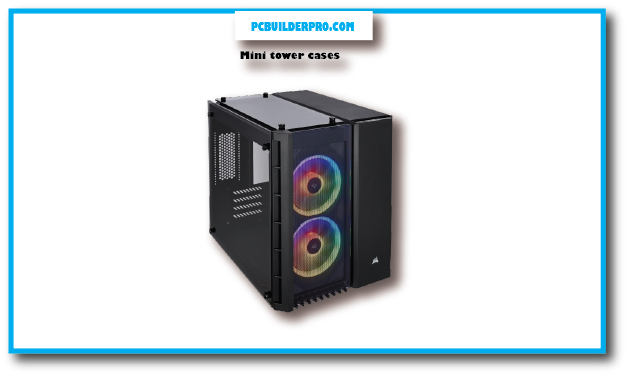
Mini tower cases are like the compact sports cars of the PC world, designed to maximize your space and portability. Perfect for those with limited room, like apartment dwellers, or
anyone craving a portable gaming rig. In this guide, we’ll explore the advantages and disadvantages of mini tower cases, and introduce you to some of the best options available in 2023.
Pros of Mini Tower Cases:
Space Saver Extraordinaire: Mini towers are small and compact, making them perfect for tight spaces where every inch counts.
Grab and Go: These cases are highly portable and easy to transport, ideal for LAN parties or gaming on the move.
Just Enough Room: Despite their small size, mini tower cases can still house the most essential components for a functional PC.
Sleek and Modern: They often boast a modern and stylish design, fitting seamlessly into contemporary setups.
Cons of Mini Tower Cases:
Compact Confines: Due to their size, mini-towers have limited space for components and expansion, which might not suit power users or those planning elaborate setups.
Cooling Constraints: Smaller cases may struggle with airflow and cooling potential, potentially leading to higher temperatures under heavy loads.
Compatibility Concerns: Not all components, especially large graphics cards or custom water cooling loops, fit snugly into mini-tower cases.
Top Mini Tower Cases in 2023:
Here are some of the best mini tower cases available this year:
| Case Model | Key Features |
|---|---|
| Cooler Master NR200P | Compact, excellent for SFF (small form factor) builds |
| Lian Li TU150 | Portable, sleek design, great for gaming on the go |
| Silverstone ML03B-H | Compact HTPC design, ideal for media centers |
| Fractal Design Ridge | Modern aesthetics, efficient use of space |
| Hyte Revolt 3 | Highly portable, versatile configurations |
Choosing the Right Mini Tower Case:
When picking a mini tower case, consider these factors:
Size Does Matter: Measure your available space to ensure a snug fit for your mini tower case.
Cooling Considerations: Assess your cooling needs. If you’re planning demanding tasks or high-end components, opt for a case with excellent airflow and cooling potential.
Component Compatibility: Ensure the case can accommodate all the components you intend to use. Larger graphics cards and custom cooling solutions may not fit.
Budget Blueprint: Set a budget before you start shopping. Mini tower cases can range from budget-friendly to premium options.
Extra Notes:
Mini tower cases can be more challenging to build in and manage cables due to their compact nature.
These cases may lack some features found in larger cases, such as RGB lighting, cable management options, and tempered glass panels.
The variety of mini tower cases might not be as extensive as mid or full towers, so you might need to do more research to find the perfect fit.
Mini tower cases are the go-to choice for space-conscious users and those on the move. While they excel in saving room and enhancing portability,
it’s crucial to ensure compatibility with your components and consider your cooling needs.
In the world of PC cases, mini towers are like pocket-sized superheroes, ready to help you make the most of your space. So, measure your space, define your cooling goals,
prioritize your components, and stick to your budget. Your perfect mini tower case is out there, waiting to house your next compact PC adventure.
4. Desktop Case
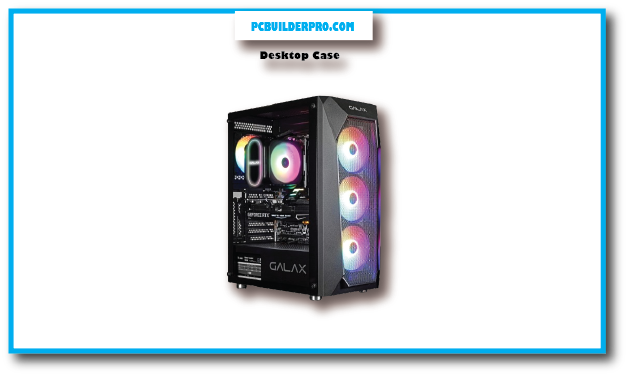
Desktop cases are the sturdy homes for your PC components, ensuring they’re safe and sound. Choosing the right one is crucial for a successful build. In this guide,
we’ll explore key considerations, including size, cooling, compatibility, and features, and present some of the best desktop cases available in 2023.
Size Matters: Desktop cases come in various sizes to fit different needs:
Full Tower Cases: These are the giants, offering vast space for your components and expansion.
Mid-Tower Cases: Striking a balance between size and features, they’re a popular choice for many.
Mini Tower Cases: Compact and portable, ideal for space-conscious users.
Cooling Considerations: Ensuring your components stay cool is essential. Look for cases with good airflow and cooling potential,
especially if you plan to overclock or use high-end hardware. Consider the number of fan mounts and ventilation holes.
Component Compatibility: Check that your chosen case is compatible with your components. Measure your motherboard, graphics card, and other parts to ensure they’ll fit snugly.
Desirable Features: Desktop cases can offer various features, including:
RGB Lighting: For a touch of dazzle.
Cable Management Options: Keeping things tidy.
Tempered Glass Panels: Adding a touch of elegance.
Choose a case that aligns with your feature preferences.
Setting Your Budget: Desktop cases can range from budget-friendly to premium options. Determine your budget before you start shopping and stick to it.
Top Desktop Cases in 2023:
Here are some of the best desktop cases in each category for 2023:
Full Tower Cases:
Corsair Obsidian 1000D: A behemoth with premium materials.
Phanteks Enthoo Pro: Offering excellent space and customization.
Fractal Design Define 7 XL: Sleek design and ample storage options.
Mid-Tower Cases:
Corsair 4000D Airflow: Compact with excellent airflow and cable management.
Fractal Design Meshify C: Sleek design and outstanding airflow.
Phanteks P400A: High airflow and spacious interior.
Mini Tower Cases:
Cooler Master NR200P: Compact and excellent for small form factor builds.
Lian Li TU150: Portable and sleek, perfect for gaming on the go.
Silverstone ML03B-H: Compact HTPC design, ideal for media centers.
Selecting the right desktop case is crucial for a successful PC build. Your choice should align with your budget, component compatibility, cooling needs, and desired features.
The world of desktop cases offers options for every PC builder, whether you need the spacious embrace of a full tower, the versatile mid-tower, or the compact charm of a mini tower.
By carefully considering all the factors mentioned here, you can confidently find the perfect desktop case to house your components and set the stage for your next computing adventure.
5. Small Form Factor (SFF)
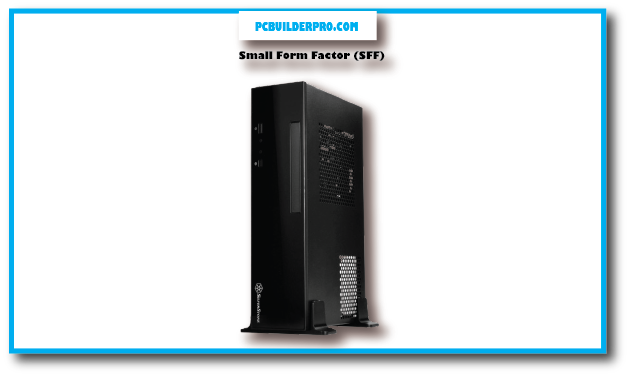
Small Form Factor (SFF) PC cases are the epitome of compact efficiency, designed for users with space constraints or a craving for a portable gaming powerhouse. These cases often house Mini-ITX or Micro-ATX
motherboards and come with fewer expansion slots and fan mounts. In this guide, we’ll delve into the world of SFF PC cases, discussing their merits and demerits, and introducing some of the best options available in 2023.
Pros of SFF PC Cases:
Space-Saving Wonders: SFF cases are smaller and more compact than traditional desktop cases, making them ideal for those with limited space, like apartment dwellers or small home residents.
Portable Potential: They’re often designed with portability in mind, making them an excellent choice for those who want to carry their gaming rig to LAN parties or anywhere else.
Sleek and Stylish: Many SFF cases sport a modern and sleek design, fitting well with contemporary setups.
Cons of SFF PC Cases:
Limited Space: Due to their size, SFF cases offer less room for components and expansion, which might not suit power users or those with elaborate setups in mind.
Cooling Challenges: Smaller cases may struggle with airflow and cooling potential, potentially resulting in higher temperatures, especially with demanding components.
Build Difficulty: They can be more challenging to build in due to their compact nature, requiring meticulous cable management and component positioning.
Cost Considerations: SFF cases can be pricier than traditional desktop cases due to their specialized design and compact form factor.
Top SFF PC Cases in 2023:
Here are some of the best SFF PC cases on the market this year:
Cooler Master NR200P: Compact and efficient for small form factor builds.
Lian Li TU150: Portable and sleek, perfect for gaming on the go.
Silverstone ML03B-H: Compact HTPC design, ideal for media centers.
Fractal Design Ridge: Modern aesthetics and efficient use of space.
Hyte Revolt 3: Highly portable and versatile configurations.
Choosing the Right SFF PC Case:
When selecting an SFF PC case, consider the following factors:
Component Compatibility: Ensure the case can accommodate all your components. Measure your motherboard, graphics card, and other parts to ensure they’ll fit inside.
Cooling Needs: Assess your cooling requirements. Opt for a case with good airflow and cooling potential, especially if you plan to use high-end hardware or overclock.
Budget Boundaries: Set a budget before shopping. SFF cases vary in price, so establish your financial limits.
Build Skill: Be aware that building in an SFF case can be more challenging due to the limited space, so be prepared for some complexity.
SFF PC cases are the go-to choice for those who need a compact yet powerful PC solution. While they excel in saving space and portability,
it’s essential to ensure compatibility with your components and consider your cooling needs.
In the world of desktop cases, SFF cases are like the pocket-sized superheroes of the PC world, ready to tackle your space constraints and gaming dreams.
So, measure your space, evaluate your cooling requirements, and stick to your budget. Your ideal SFF PC case is out there, waiting to house your next compact PC adventure.
6. Ultra-Small Form Factor (USFF)
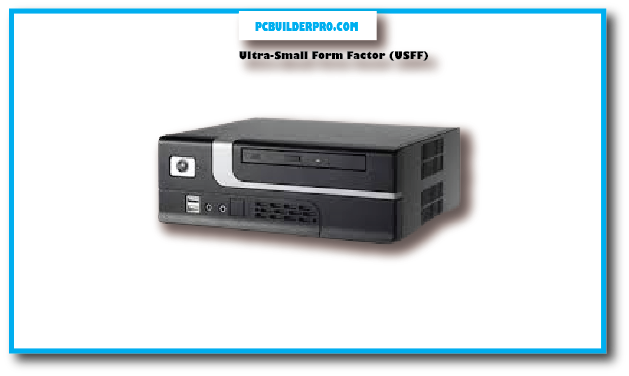
Ultra-Small Form Factor (USFF) PC cases are the champions of compact efficiency, designed for users with the tiniest spaces, a need for portability, or businesses aiming to make the most of small-scale deployments.
These cases typically employ Pico-ITX motherboards, the smallest of their kind. Although they come with minimal fan mounts and expansion slots, some USFF cases can house high-end components. In this guide,
we’ll explore the world of USFF PC cases, highlighting their pros and cons, and presenting some of the best options available in 2023.
Pros of USFF PC Cases:
Tiny Titans: USFF cases are incredibly small and compact, making them the perfect solution for those with extremely limited space, like tiny homes or apartment residents.
Easy to Transport: Their compact size and often sleek design make them highly portable and ideal for users who need a PC on the move.
Aesthetic Appeal: Many USFF cases boast a modern and stylish design that complements contemporary setups.
Cons of USFF PC Cases:
Minimal Space: Due to their size, USFF cases offer very little room for components and expansion, limiting their suitability for power users or those planning complex setups.
Cooling Challenges: Smaller cases often struggle with airflow and cooling potential, which can lead to higher temperatures, particularly with demanding hardware.
Complex Building: Building in a USFF case can be more challenging due to limited space, so meticulous component positioning and cable management are essential.
Higher Costs: USFF cases can be more expensive than traditional desktop cases, partly due to their specialized design and compact form factor.
Top USFF PC Cases in 2023:
Here are some of the best USFF PC cases on the market this year:
Intel NUC 12 Extreme: Compact and efficient for small form factor builds.
Beelink SER6 Pro: Portable and versatile for various uses.
ASRock DeskMini X300: Powerful and compact for high-end components.
Gigabyte BRIX GB-BRX570G5: A compact solution with versatile features.
MSI Cubi 5 12M: Highly portable and efficient.
Choosing the Right USFF PC Case:
When selecting a USFF PC case, consider these factors:
Component Compatibility: Ensure the case can accommodate all your components. Measure your motherboard, graphics card, and other parts to ensure they’ll fit.
Cooling Needs: Assess your cooling requirements. Opt for a case with good airflow and cooling potential, especially if you plan to use high-end hardware or overclock.
Budget Boundaries: Set a budget before shopping. USFF cases come in varying price ranges, so establish your financial limits.
Build Expertise: Be prepared for the additional complexities of building in a USFF case due to its limited space.
USFF PC cases are the go-to choice for those who require the smallest and most compact PC solutions. While they excel in saving space and portability,
it’s essential to ensure compatibility with your components and consider your cooling needs.
In the world of desktop cases, USFF cases are like the pocket-sized superheroes of the PC world, ready to tackle your space constraints and portable PC dreams.
So, measure your space, assess your cooling needs, and stick to your budget. Your ideal USFF PC case is out there, ready to house your next compact PC adventure.
7. Cube PC Cases
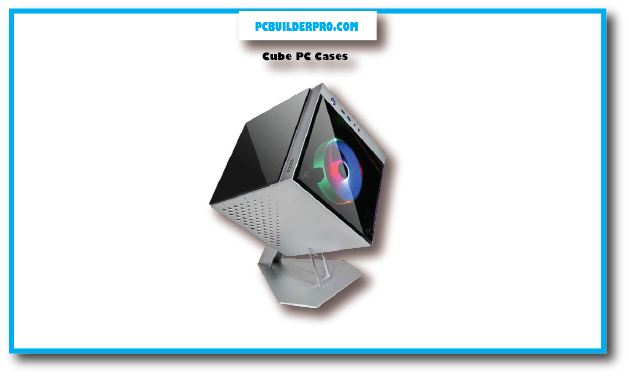
Cube PC cases are the embodiment of compact style and functionality. Shaped like cubes, these Small Form Factor (SFF) cases provide a unique and efficient housing for powerful components.
Cube cases are favored by users who seek a blend of compactness, style, and portability.
In this guide, we’ll explore the world of cube PC cases, highlighting their advantages and drawbacks, and introducing some of the best options available in 2023.
Pros of Cube PC Cases:
Compact Charm: Cube PC cases are small and stylish, offering an elegant and unique look.
Portability Plus: They are easy to transport, making them an excellent choice for users on the move.
Cool and Breezy: Cube cases often come with good airflow and cooling potential, ensuring that your components remain at optimal temperatures.
Cons of Cube PC Cases:
Limited Space: Due to their size, cube PC cases may have less room for components and expansion, which might not be suitable for those with extensive setups in mind.
Tricky Building: Building inside a cube case can be more challenging due to its compact nature, requiring careful component placement and cable management.
Investment Required: Cube cases can be pricier than traditional desktop cases due to their unique design and compact form factor.
Top Cube PC Cases in 2023:
Here are some of the best cube PC cases on the market this year:
Silverstone ML03B-H: Compact HTPC design with efficiency.
Cooler Master NR200P: Compact and efficient for small form factor builds.
Lian Li TU150: Portable and sleek, ideal for gaming on the go.
Fractal Design Ridge: Modern aesthetics and space-efficient design.
Hyte Revolt 3: Highly portable and versatile configurations.
Choosing the Right Cube PC Case:
When selecting a cube PC case, consider these factors:
Component Compatibility: Ensure the case can accommodate all your components. Measure your motherboard, graphics card, and other parts to ensure they’ll fit.
Cooling Needs: Assess your cooling requirements. Opt for a case with good airflow and cooling potential, especially if you plan to use high-end hardware or overclock.
Budget Boundaries: Set a budget before shopping. Cube cases come in varying price ranges, so establish your financial limits.
Build Skill: Be prepared for the potential complexities of building in a cube case due to its compact nature.
Cube PC cases are the go-to choice for users seeking a compact and stylish PC, as well as those who require portability.
While they excel in providing a unique aesthetic, it’s vital to ensure compatibility with your components and assess your cooling needs.
In the world of desktop cases, cube cases are like compact works of art that house powerful hardware. So, measure your space, assess your cooling needs, and stick to your budget.
Your ideal cube PC case is waiting to house your next compact and stylish PC build.
8. Rackmount PC Cases
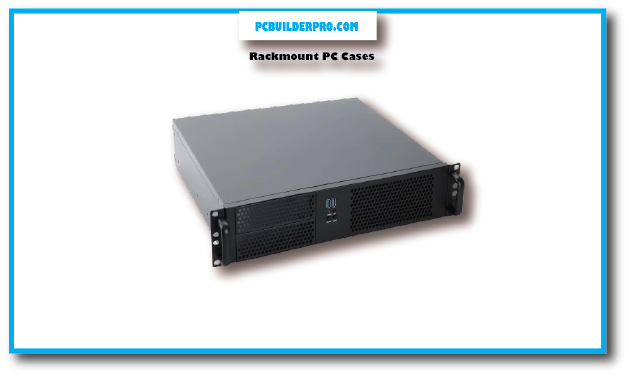
Rackmount PC cases are tailor-made for businesses and organizations that need to deploy multiple servers in a confined space. These cases, designed for mounting in standard server racks, offer security and efficient
cooling. They differ from traditional desktop cases in terms of their taller and narrower form factor and multiple mounting points.
In this guide, we’ll delve into the world of rackmount PC cases, discussing their benefits and considerations, and presenting some of the best options available in 2023.
Pros of Rackmount PC Cases:
Space Efficiency: Rackmount PC cases excel in deploying a large number of servers in a limited space, making them a go-to choice for businesses with space constraints.
Enhanced Security: Servers housed in rackmount cases are better protected from physical damage and tampering.
Maintenance Ease: These cases are designed for easy maintenance and repair, ensuring that businesses can keep their systems running smoothly.
Effective Cooling: Rackmount PC cases often come with effective airflow and cooling mechanisms, maintaining optimal operating temperatures.
Cons of Rackmount PC Cases:
Higher Costs: Rackmount cases can be more expensive than traditional desktop cases due to their specialized design and robust construction.
Complex Building: Building within rackmount cases can be more challenging, given their specialized form factor and potential limitations.
Compatibility Concerns: Rackmount cases may not be compatible with all components, so it’s essential to ensure your chosen hardware fits.
Top Rackmount PC Cases in 2023:
Here are some of the best rackmount PC cases available this year:
- Rosewill RSV-4000 4U Rackmount Chassis: A reliable 4U option for server deployment.
- Silverstone RM44 4U Rackmount Chassis: A versatile choice with excellent cooling capabilities.
- Supermicro CSE-826TQ 4U Rackmount Chassis: A robust and efficient 4U solution for servers.
- Chenbro RM423-4U 4U Rackmount Chassis: A reliable and well-ventilated 4U case.
- Fractal Design Define R500 4U Rackmount Chassis: A secure and efficient choice for server deployments.
Choosing the Right Rackmount PC Case:
When selecting a rackmount PC case, consider these factors:
Size: Rackmount PC cases come in various sizes, typically measured in rack units (U), from 1U to 4U. Choose the size that fits your server needs.
Weight: Rackmount cases can be heavy, particularly when loaded with components. Ensure your chosen case is compatible with your rack and manageable for installation and removal.
Cooling Needs: Rackmount cases require efficient cooling. Opt for a case with good airflow and cooling potential to maintain optimal server temperatures.
Features: Rackmount PC cases can offer various features like hot-swappable drive bays, redundant power supplies, and cable management options. Select a case that aligns with your server’s specific requirements.
Rackmount PC cases are the go-to choice for businesses and organizations seeking space-efficient and secure server deployment solutions.
While they excel in efficiency and security, it’s crucial to ensure compatibility with your components and assess your server’s unique needs.
In the world of server deployments, rackmount cases are the champions of space-saving and protection. So, measure your space, evaluate your server’s cooling requirements, and stick to your budget.
Your ideal rackmount PC case is ready to secure your server’s future with efficiency and resilience.
What are the different sizes of PC cases available?
PC cases are like houses for your computer parts. They come in many sizes. The biggest ones are called full-tower and the smallest ones are known as small form factor (SFF).
Imagine a full-tower like a big mansion with lots of rooms, and SFF like a cozy little apartment.
What size case do I need for my computer parts?
Choosing the right size for your PC case is like picking the right size backpack for your school books. If you have a big textbook (like an ATX motherboard) and lots of notebooks
(other computer parts), you’ll need a bigger backpack (case). If you only have a small diary (Mini-ITX motherboard) and a few pens (fewer parts), a small bag (case) will do.
Bigger cases are great if you think you might get more books later (upgrades).
What type of motherboard will fit in a specific case size?
Just like certain backpacks have special pockets for laptops of specific sizes, PC cases are built to hold certain sizes of motherboards.
Always check the label (case’s specifications) to see if your laptop (motherboard) will fit.
Can a small PC case be powerful for gaming?
Absolutely! Even a small backpack can carry a heavy laptop. Some SFF cases can fit really strong parts for gaming. But remember,
it might get heavy and won’t have much room for your water bottle and snacks (cooling and upgrades).
Will a full-tower case be too big for my desk?
A full-tower case can be like a big suitcase on a small coffee table. Make sure to measure your table (desk space) before you buy that big suitcase (case).
Do PC cases come with built-in fans for cooling?
Many PC cases come with fans already inside, like a car with air conditioning included. But not all do, so it’s like checking if the car has AC before you buy it.
Can I see inside my computer through the case?
Some PC cases have clear side windows, like a house with a big window. You can look in and see all the pretty lights and parts inside.
Are there cases with special lighting effects?
Yes, some PC cases come with fancy lights, like Christmas lights for your computer. You can change the colors and make them dance to your favorite songs.
How many hard drives can I fit in a particular case?
The number of hard drives you can fit is like the number of cup holders in a car. Check the car’s (case’s) manual to see how many drinks (drives) you can bring along.
Is it easy to upgrade components inside a PC case?
It’s usually easier to add new things to a bigger house (case). Full-tower and mid-tower cases have more room to move furniture around (upgrade components).
What type of case is best for a gaming PC?
Think of a mid-tower case as the perfect backpack for a hiking trip. It’s not too big or too small and has just enough space for all your gear (like a powerful graphics card) and snacks
(cooling systems). It’s the go-to choice for gamers who want a smooth journey (gaming experience).
I want a quiet computer, are there silent PC cases?
While no PC case is completely silent, some are like libraries, designed to keep noise to a whisper. They have special walls (insulation) and quiet fans that work like silent librarians,
keeping things cool without a fuss. Look for cases that promise a quiet study environment (operation).
I travel with my PC sometimes, what case is most portable?
If you’re always on the move, a small form factor (SFF) case is like a travel suitcase for your computer. It’s light and easy to carry, perfect for those who like to take their tech on adventures.
I’m building a PC for the first time, what case should I get?
For first-time builders, a mid-tower case is like training wheels on a bike. It gives you a balance between room to grow (size) and ease of use (functionality), making it a great
starting point for your building journey.
Are there space-saving PC cases for small offices?
Yes, there are! SFF and mini-tower cases are like compact cars, designed to fit into tight parking spots (small offices). They’re great for saving space but remember to check the
car’s AC (airflow) for those hot summer days (demanding tasks).
What are the most important things to consider when choosing a PC case?
When picking a PC case, think about the size of your motherboard, the features you want (like a sunroof or heated seats, but for PCs), how much room you have on your desk, and
whether you might want to add more stuff later (upgrade potential).
Are expensive PC cases always better?
Not always. Think of it like buying a fancy pen. Sometimes you’re paying for the brand name or the look, but what matters is if it writes well (the features you need).
Where can I find reviews of different PC cases?
For reviews, the internet is your oyster. Tech websites and YouTube are like food critics for PC cases, offering their take on the latest models. Look for reviews that talk about what’s
important to you, like how much storage space (drive bays) they have or how cool they keep your parts (cooling efficiency).
What are some popular PC case brands?
Brands like NZXT, Corsair, Fractal Design, Phanteks, and Cooler Master are like the big fashion labels of the PC world. They’re well-known and have lots of fans (both literal and figurative).
Once I have a case, can I customize it with lights or fans?
Absolutely! Adding lights or extra fans to your PC case is like putting stickers and keychains on your backpack. It makes it uniquely yours.
Just make sure the stickers will stick and the keychains won’t break off (compatibility) before you start decorating.
Conclusion
Picking a PC case is like choosing the right outfit – you want it to fit your style and needs. Let’s keep it simple and fun:
Full Tower Case: If you want a PC home that can fit all the cool gadgets and keep it cool, go for the full tower. But remember, it’s like buying a fancy, spacious mansion – it can be a bit pricey and takes up space.
Mid-Tower Case: If you’re on a budget but still want a comfy place for your PC parts, the mid-tower is like a cozy apartment. It fits most stuff and keeps things breezy.
Mini Tower, SFF, or USFF Case: These are tiny houses for your PC, perfect for the minimalist. But like a tiny home, they might not fit everything, and it can get a bit toasty in there.
Cube and Rackmount Cases: Cubes are like the quirky, stylish condos of the PC world, while rackmounts are the office buildings. Cubes make your PC look cool, and rackmounts are for the business crowd.
Just remember, when picking a case, think about what your PC wants – the size of the motherboard, what parts it likes, how it stays chill, and what’s in your wallet. Make sure your PC’s outfit fits its personality! 😉
FAQs
What is a PC case
The PC case is the enclosure that houses all of the components of your computer, such as the motherboard, CPU, GPU, RAM, storage drives, cooling fans, and power supply.
What are the different types of PC cases?
There are eight main types of PC cases:
Full tower
Mid tower
Mini tower
Desktop
Small form factor (SFF)
Ultra-small form factor (USFF)
Cube
Rackmount
How do I choose the right PC case?
When choosing a PC case, you should consider the following factors:
Motherboard form factor: Make sure the case you choose is compatible with the form factor of your motherboard.
Component compatibility: Make sure the case you choose is large enough to accommodate all of your components, including your graphics card, power supply, and drives.
Cooling: Make sure the case you choose has good cooling capabilities. This is especially important for high-end gaming and workstation PCs.
Price: PC cases range in price from around $50 to $500. Choose a case that fits your budget.
What are some of the best PC cases on the market?
Some of the best PC cases on the market include:
Corsair 4000D Airflow
Fractal Design Meshify 2 Compact
Lian Li O11 Dynamic Mini
NZXT H510 Flow
Phanteks Eclipse P300A
What if I need a PC case for a specific purpose?
If you need a PC case for a specific purpose, such as gaming, overclocking, or water cooling, there are cases that are specifically designed for those purposes.
For example, gaming cases typically have good airflow and support for multiple graphics cards. Overclocking cases typically have good cooling capabilities and support for high-end components. Water cooling cases typically have mounting points for radiators and water pumps.
Where can I buy a PC case?
Amazon
Newegg
B&H Photo Video
Microcenter
Best Buy

